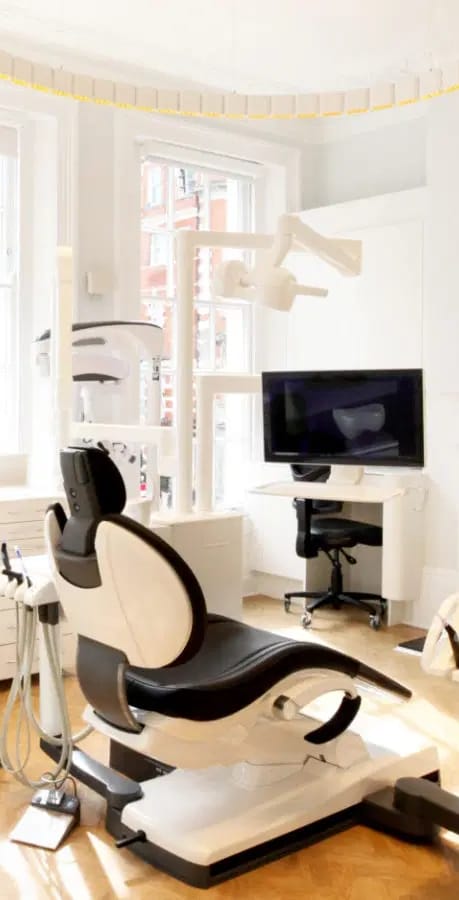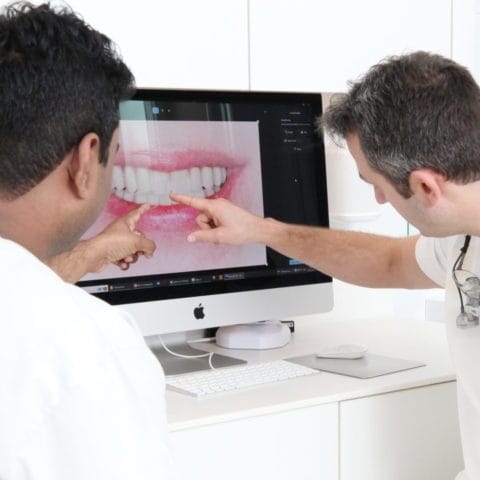Dental Crowns in London
A dental crown is a tooth-shaped cap placed over a weak tooth, covering it and restoring its function, strength and appearance. Crowns can be a good treatment choice for root-treated teeth or for teeth that have had very extensive damage.

Treatment
1 hour per crown

Price
From £1,600

Team Experience
60+ years

Recovery Time
1+ day

Google Rating
★★★★★ (4.9)
Examples of our work
Dental crowns are an ideal solution for restoring the strength, shape, and appearance of damaged or worn teeth. At Wimpole Street Dental Clinic, our case studies in dental crowns showcase the transformations we achieve, from restoring functionality to enhancing aesthetic appeal. Each case reflects our commitment to precision and patient-focused care, providing long-lasting results that seamlessly blend with each patient’s natural smile.

Tooth decay or trauma can severely damage teeth. Once weakened, these teeth will be mechanically less able to withstand the force of your bite. Crowns can clamp the weakened parts of the teeth, keeping everything together and preventing the tooth to fracture further or even split.
A dental crown covers the visible part of the tooth and at Wimpole Street Dental Clinic is always made of full ceramic material and will always look incredibly natural. Often a crown is also used to dramatically improve the appearance of a damaged tooth.
Who is suitable for dental crowns?
Crowns can be used in different situations:
To adequately restore a root-treated tooth
To restore the shape, appearance, and strength of a heavily filled tooth
To restore a fractured tooth
To reverse the so-called cracked tooth syndrome and to prevent cracks inside of a tooth to propagate
To restore the function and aesthetics of severely worn-down teeth
To dramatically improve the discolouration of a tooth
What types of crowns are there?
Crowns cover the entirety of the visible part of a tooth and can be made out of different materials:
- Temporary crowns: Used after the preparation of the tooth whilst we wait for the lab to fabricate the final crown. Usually made of acrylic or composite.
- Metal-ceramic crowns or porcelain-fused-to-metal crowns: These have a metal framework which is then veneered with porcelain. This was the gold standard in dentistry for many years.
- Gold crowns: Apart from their out-of-style appearance, gold is a very good material for crowns. We still use them on the very back teeth, where they don’t stand out, for patients who have a very strong bite and prioritise longevity.
- Porcelain crowns: The term is synonymously used with all-ceramic crowns, meaning that the crown material does not contain metal.
- Zirconia crowns: Our preferred type of crowns. They are metal-free, very strong, yet also beautiful. Zirconia is also the most biocompatible material we can use, which makes gums happy. We have had many improvements in the last decade on zirconia crowns, and they keep getting better and better.
- Implant crowns: Implant crowns are placed on the titanium screw which sits in the bone
- Ceramic crowns: See porcelain crowns. Ceramics can also be used for dental bridges
- Telescopic crowns: All-ceramic, non-noble alloy or gold crowns underneath a removable “telescopic” denture
If you’re looking for dental crowns in London that provide the most aesthetically pleasing result, we recommend all-ceramic crowns. This type mimics the tooth most accurately, coming as close to your natural tooth as possible in terms of looks, whilst at the same time providing durability and biocompatibility.
Meet your award-winning Dental Crowns dentist and team…
- We have over 75+ years of combined dentistry experience across our specialist team.
- 10,000+ treatments performed and counting.
- We are leaders in the dental industry – we regularly teach, lecture and publish our research work internationally.
Our Expertise
Protecting and restoring your smile doesn’t just have dental health benefits but it can also restore self-confidence and help patients feel less self-conscious about their appearance. Wimpole Street Dental Clinic is the perfect choice for patients considering a dental crown for a number of reasons:
Our team have decades of combined experience, craft and expertise in restorative and cosmetic dentistry. We are regularly invited to share our knowledge with our colleagues and students on the lecture circuit worldwide. Specifically for dental crowns, we design the full ceramic crowns we use ourselves in our own dental laboratory, giving us complete control over both the product and the service we can offer. You can rest assured that we know every component in the dental crown and that your crown has been custom-made to the highest standard by our team.
Our recently refurbished clinic is conveniently located in the heart of central London, off the prestigious Wimpole Street.
We utilise the very latest state-of-the-art technology to help visualise and plan our dental treatments. Using the most effective and innovative dental techniques, we’re able to provide our patients with reliable, aesthetically pleasing results consistently.

Helen Li
Wimpole Street Dental has the highest most ethical standard of work, personable approach, clear and safe procedures, top notch excellence and reliability in treatment provided with utmost professionalism from crème de la crème world class specialists all under one roof.
What happens during dental crown preparation?
After careful evaluation and deciding together with the patient that a crown is the best restorative choice for your tooth, your dentist will proceed with the preparation of the tooth for a crown. It will all be absolutely pain-free, of course.
He then either takes a digital scan of the tooth or sometimes an impression with silicone. The tooth is immediately restored with an excellent temporary crown, which will feel and look like the final one, except that it is made of acrylic. Our master dental technicians will then produce the crown with exceptional attention to detail, ensuring that it not only looks great but also has a high-precision fit. Our dental laboratory in London or Munich will deliver the perfect match in both functionality and aesthetics.
When the crown is ready, we clean the affected tooth, fitting the crown to it seamlessly with adhesive dental cement.
Post-treatment, we recommend our patients schedule routine appointments with us to include an assessment of the stability of their dental crowns now fitted.
Take your first step with Wimpole Street Dental Clinic
Discover the path to a brighter smile with Wimpole Street Dental Clinic! Our team of skilled professionals utilises advanced technology to provide personalised dental care in a comfortable setting.
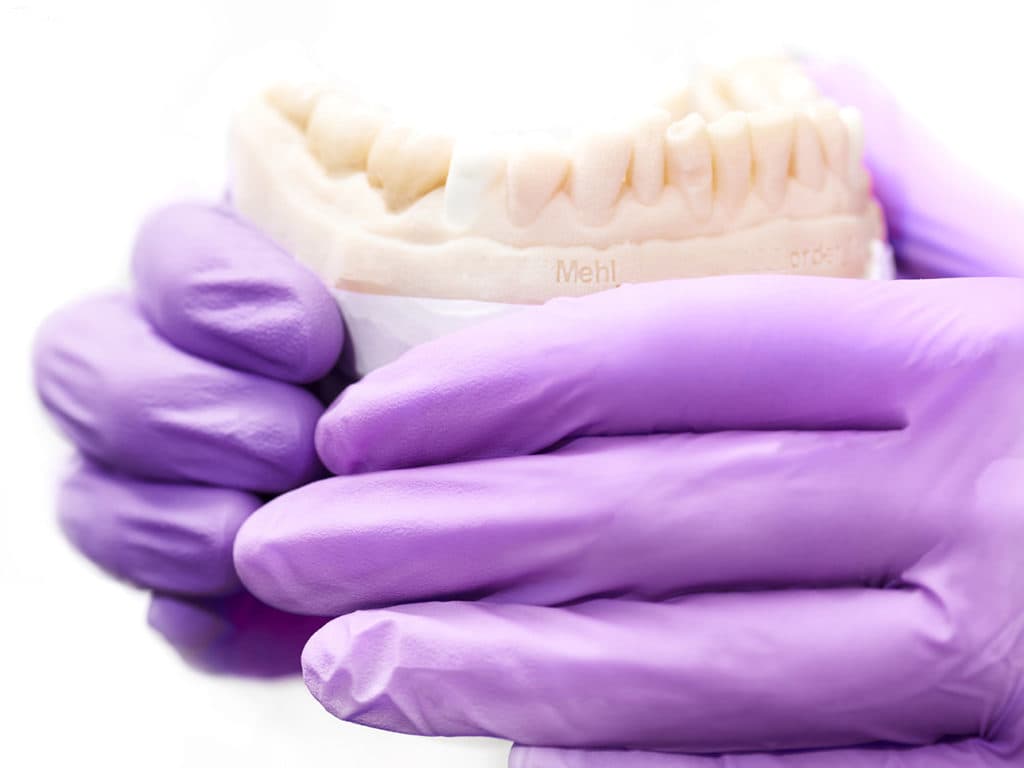
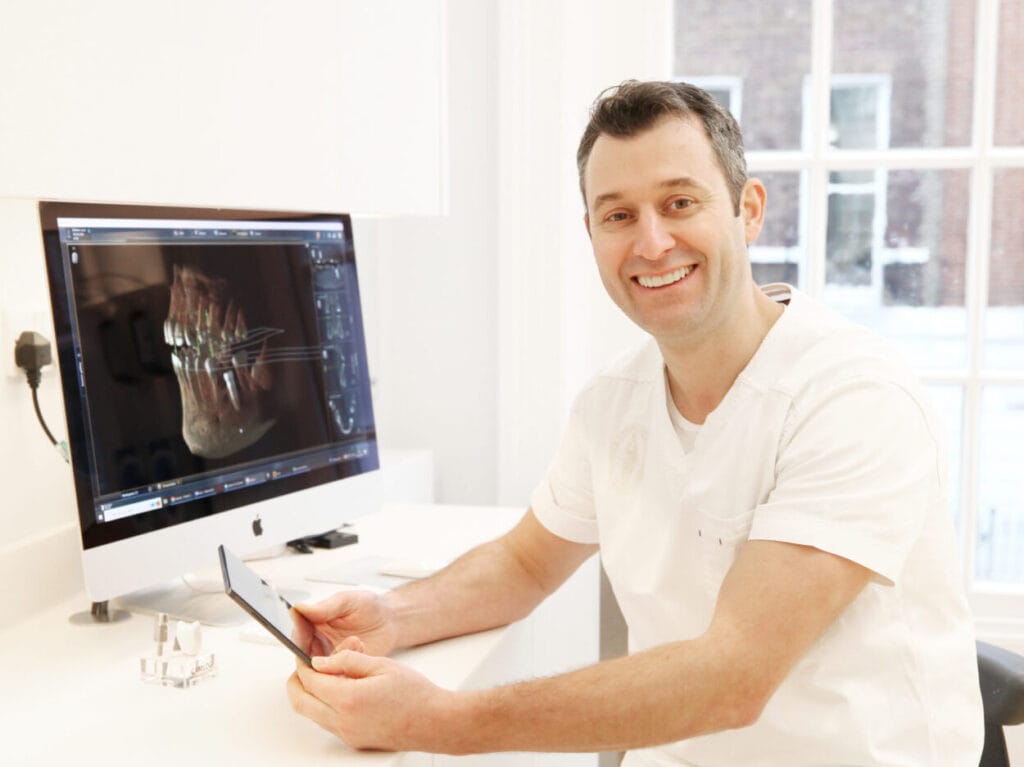
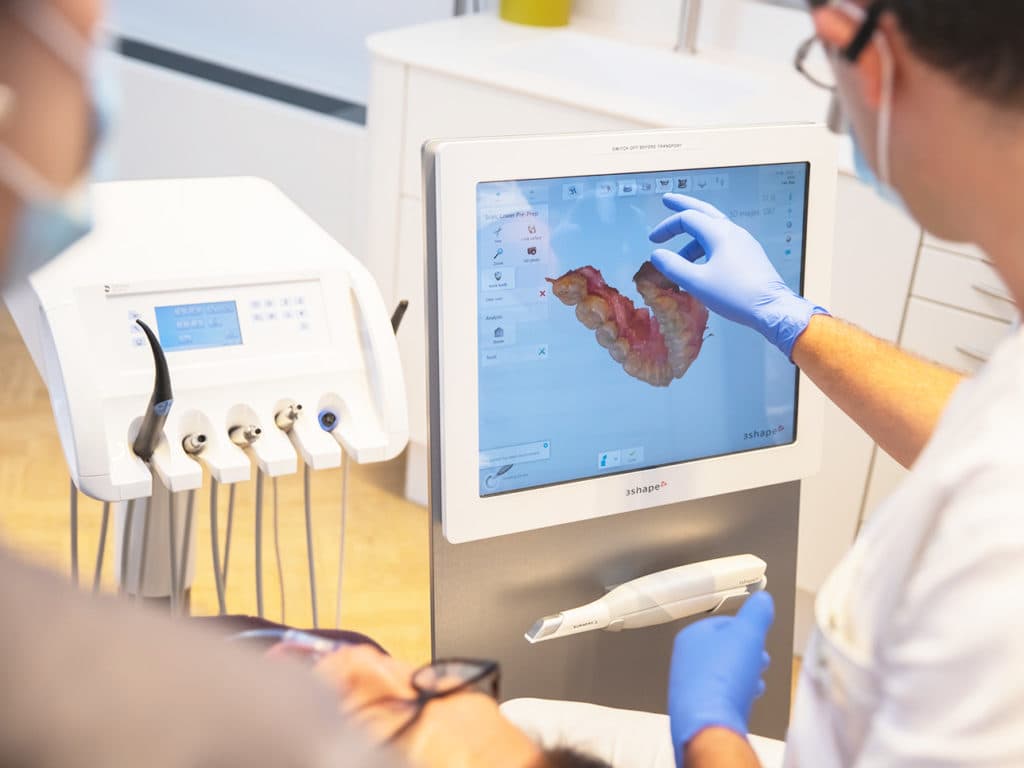
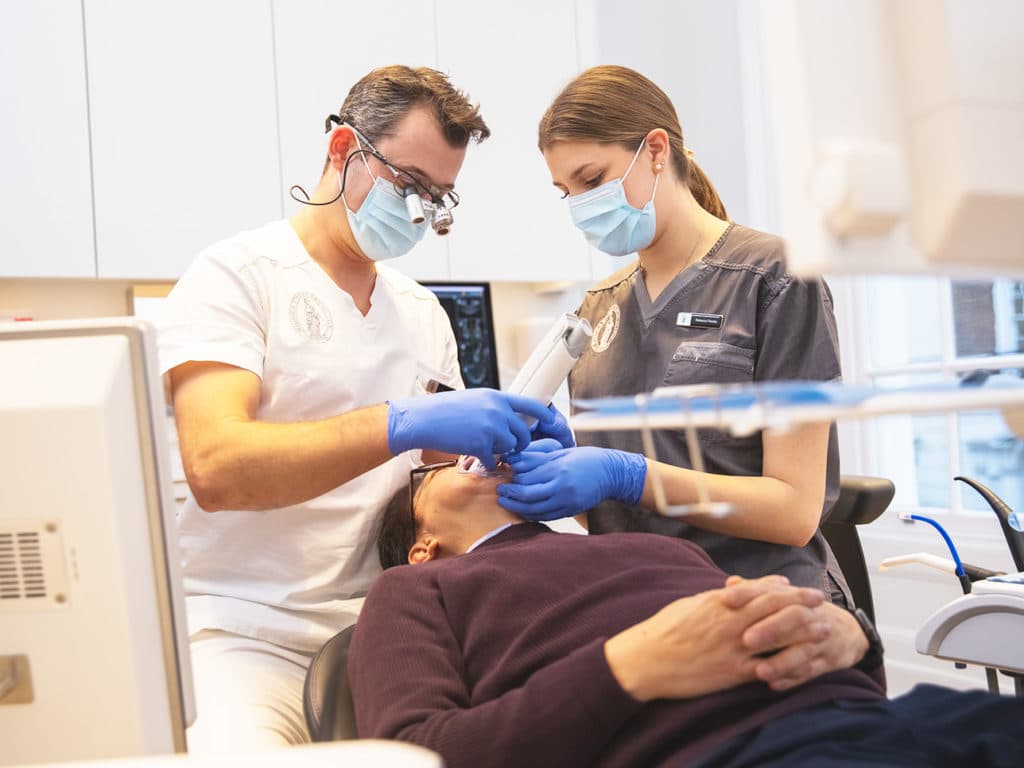

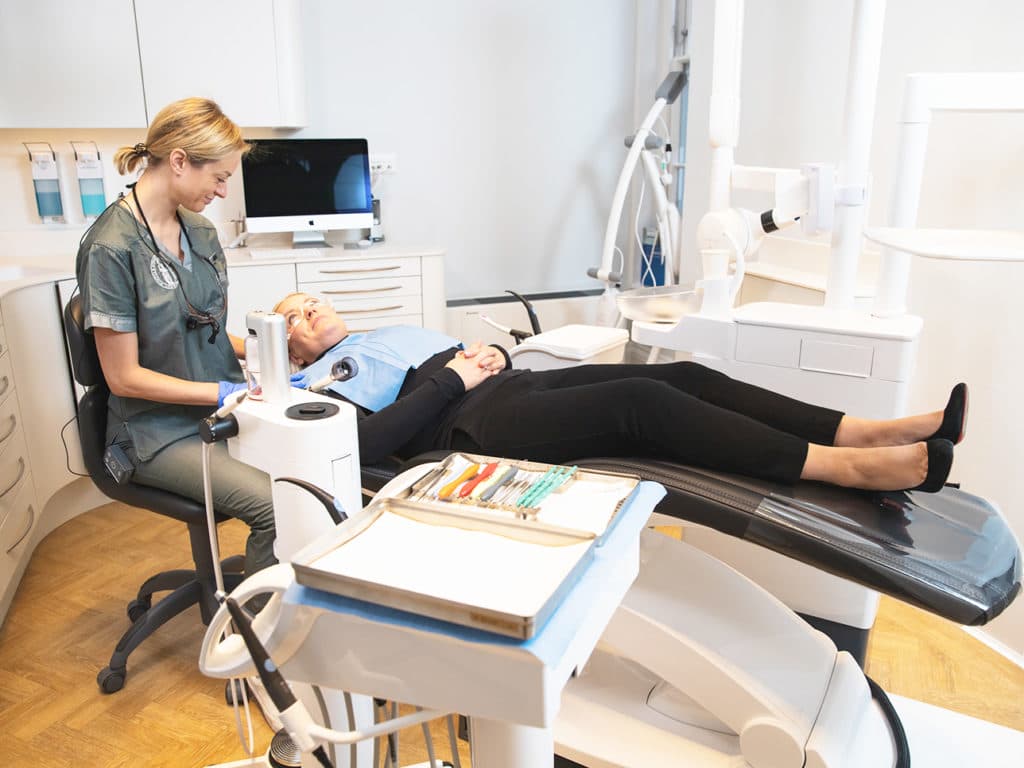
New page design
Written by: Prof Dr Christian Mehl
Medically reviewed by: Dr Raul Costa
Author biography added
Written by: Prof Dr Christian Mehl
Medically reviewed by: Dr Raul Costa
Original content created
Written by: Prof Dr Christian Mehl
Medically reviewed by: Dr Raul Costa
Wimpole St Dental Clinic has strict sourcing guidelines and relies on peer-reviewed studies, academic research institutions, and medical associations. We avoid using tertiary references. You can learn more about how we ensure our content is accurate and current by reading our editorial policy.
- Mehl C, Harder S, Wolfart M, Kern M, Wolfart S. Retrievability of implant-retained crowns following cementation. Clin Oral Implants Res. 2008 Dec;19(12):1304-11. doi: 10.1111/j.1600-0501.2008.01587.x. PMID: 19040447.
- Mehl C, Harder S, Steiner M, Vollrath O, Kern M. Influence of cement film thickness on the retention of implant-retained crowns. J Prosthodont. 2013 Dec;22(8):618-25. doi: 10.1111/jopr.12058. Epub 2013 Aug 5. PMID: 23915027.
- Mehl C, Scheibner S, Ludwig K, Kern M. Wear of composite resin veneering materials and enamel in a chewing simulator. Dent Mater. 2007 Nov;23(11):1382-9. doi: 10.1016/j.dental.2006.11.026. Epub 2007 Jan 8. PMID: 17210173.
- Cheung W. A review of the management of endodontically treated teeth. Post, core and the final restoration. J Am Dent Assoc. 2005 May;136(5):611-9. doi: 10.14219/jada.archive.2005.0232. PMID: 15966648.
- Patnana AK, Chugh VK, Chugh A, Vanga NRV, Kumar P. Effectiveness of zirconia crowns compared with stainless steel crowns in primary posterior teeth rehabilitation: A systematic review and meta-analysis. J Am Dent Assoc. 2022 Feb;153(2):158-166.e5. doi: 10.1016/j.adaj.2021.08.005. PMID: 35086644.
- Patnana AK, Chugh VK, Chugh A, Vanga NRV, Kumar P. Effectiveness of zirconia crowns compared with stainless steel crowns in primary posterior teeth rehabilitation: A systematic review and meta-analysis. J Am Dent Assoc. 2022 Feb;153(2):158-166.e5. doi: 10.1016/j.adaj.2021.08.005. PMID: 35086644.
- Hammoudi W, Trulsson M, Svensson P, Smedberg JI. Long-term results of a randomized clinical trial of 2 types of ceramic crowns in participants with extensive tooth wear. J Prosthet Dent. 2022 Feb;127(2):248-257. doi: 10.1016/j.prosdent.2020.08.041. Epub 2020 Dec 7. PMID: 33303191.

















